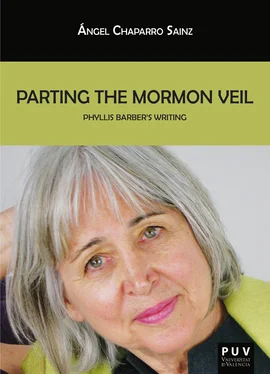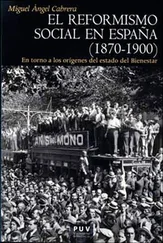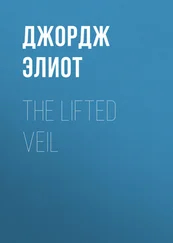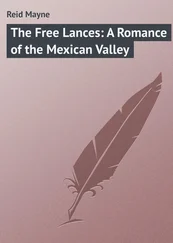PARTING THE MORMON VEIL
PHYLLIS BARBER’S WRITING
Biblioteca Javier Coy d’estudis nord-americans
http://www.uv.es/bibjcoy
Directora
Carme Manuel
PARTING THE MORMON VEIL
PHYLLIS BARBER’S WRITING
Ángel Chaparro Sainz
Biblioteca Javier Coy d’estudis nord-americans
Universitat de València
Parting the Mormon Veil: Phyllis Barber’s Writing
©Ángel Chaparro Sainz
The research carried out for the writing of this book has been funded by the Spanish Ministry of Economy and Competitiveness (code: FFI 2011-23598), and the European Regional Development Fund (ERDF). The book has been completed under the auspices of the research group REWEST funded by the Basque Government (IT360-10) and the University of the Basque Country, UPV/EHU (UFI 11/06)
1ª edición de 2013
Reservados todos los derechos
Prohibida su reproducción total o parcial
ISBN: 978-84-9134-146-8
Depósito legal: V-532-2013
Imagen de la portada: Phyllis Barber
Diseño de la cubierta: Celso Hernández de la Figuera
Publicacions de la Universitat de València
http://puv.uv.es publicacions@uv.es
Impreso en España
Zeruko soldatzailearentzat; lurrean zaintzen nauten aingeruentzat
There is love after all . Phyllis Barber
Acknowledgements
Always in debt, I can never be thankful enough for the help and support that colleagues, friends and family have given me. From here and from overseas. It’s fun to see how literature leaps oceans. Colleagues go first: I owe Vickie Olsen Osterberg big time; she was a great help to me at the beginning of this project. David Río Raigadas opened the door and he didn’t leave the room until the end. Who knows if I would have ever got inside if it hadn’t been for him. Thanks. And thanks to many other colleagues that have helped me, even though they didn’t even know: Amaia Ibarraran, Eduardo Barros, Monika Madinabeitia, Begoña Sarrionandia, Mar Felices, Eva Gómez and Irene Balza. Carme, thanks for this great opportunity. And I need to say that I will always be in debt with Mormon literary criticism, in general, and with the many Mormon writers that keep writing, whether they are A or B. They are all W: writers.
Phyllis deserves a paragraph of her own. She deserves a room of her own, a pretty room with sea sight. She sang and I listened to her. Next time, I will dare dance.
You always write your life, even when you are writing about somebody else’s. My father, Ángel, taught me a few valuable lessons: one is to love those who love you. That is why he’ll be the next one to be mentioned: wherever you are, dad, it is still very close. My mom, Nieves, made so light the burden on my shoulders: you gave me strength, mom. Jose and Ameli, smiles are priceless; countless the days you made it easier for me. Emi, Mitxel… thanks for the release. My brother, Álvaro, a fine scholar himself, showed me the right path to follow. It is always comforting to have someone to share your professional misfortunes. It wouldn’t have been possible without him. Finally, she doesn’t need a line in my acknowledgements, but Isa knows that she’s the best secret that I keep. She is the veil that parted between me and happiness. She’s the happy ending in this book.
I promise that we’ll celebrate it—whatever “it” is; you know, I, like Phyllis, don’t like close endings. And many others that I didn’t mention, but I don’t forget, will join us. I promise—though I also promised that I wouldn’t be one of those guys writing long and soppy acknolewdgements, and you see me now. Anyway, from here on, I’ll do my best to honor your precious help.
Contents
FOREWORD by Phyllis
INTRODUCTION: BEYOND THE EDGES
The Mormon Context (History and Literature):
Always with a stitch in my side
PHYLLIS BARBER’S WRITING
Biographical and Cultural Background
Religion: On Faith and Identity
Gender: On Motherhood and Womanhood
Place: On Being Raised in the West
Art: On Music and Freedom
CONCLUSION: Parting the Veils
BIBLIOGRAPHY
FOREWORD
Strange. Surreal. Stunned in car headlights in a dream. That’s how it feels to write an introduction to a book about one’s self. But don’t mistake these words for a complaint. I’m pleased to have been honored by Ángel Chaparro Sainz of the University of the Basque Country, who has written his doctoral dissertation on the subject of my work, which endeavor has resulted in the volume you now hold in your hands. But nevertheless, it is dream-like to be caught in the middle of a close reading of one’s words—words left behind when I might have been writing with abandon, unabashedly, recklessly, unafraid of who might read or discover what I had written. A writer within walls. A tree in the forest. But someone out there heard the tree falling and the sound of a pen scratching. And that would be Ángel.
One evening at my desk, while surfing through my email inbox I saw something I hadn’t seen before: an e-mail address with a mysterious “x” that never appears in a like configuration in the English language. I opened it a bit carefully, and lo and behold, it was a very kind e-mail requesting that the author and I make a connection with one another. Ángel was writing his dissertation on my work, he explained, and his girlfriend thought it might be a good idea for him to make our acquaintance, given the unlimited horizons of cyberspace. One thing led to another, and, before long, Ángel arranged an invitation for me to appear as a plenary speaker at the International Conference of the American West in Vitoria-Gasteiz, Spain—the capitol of the Basque Country. I had not realized beforehand that there was a capitol of the Basque Country, though I had heard pieces of news about Basque Separatists. There is always an education awaiting one when traveling, and especially in the enigmatic España.
After I had the opportunity to meet Ángel, his girlfriend Isa, and other of his colleagues at the University of the Basque Country, and after I was given a tour of Bilbao and Vitoria-Gasteiz, mainly in the rain, I was given the privilege of reading Ángel’s dissertation. Again and again I was amazed how someone (1) who did not know me, (2) who did not know about Mormonism (the Church of Jesus Christ of Latter-day Saints)—one of the few strictly American religions which has had a marked influence on my world view, (3) who had not lived in the American West (though he had been Americanized to some extent when living in the Midwest for a year as an exchange student), and (4) who was working in a second language, could do such an admirable job of capturing the essence of my writing, even the essence of my hopes and aspirations. There were moments while reading his work when I felt my breath catch, where I smiled with unexpected pleasure that Ángel had understood so much of what I have been trying to say and to accomplish in my writing life. An exquisite gift.
I wish all serious writers could have such as Ángel to transcribe their work, to bring it to greater light, and to provide affirmation for the many hours dedicated to the writing endeavor. To read Ángel’s critical and analytical analyses of my work is to have my eyes opened more fully to see, apprehend, and even appreciate, the disparate aspects of myself that have been brought into a clearer light through this study of my writing. To read Ángel helps me understand the complexity of my mind—its worn spots, its habits, its knee-jerk reactions, its efforts to create harmony between the either/ors, its biases, its clarity, its blind spots. I could even say I feel a measure of redemption in his observations. And, to read Ángel is to follow an academic and critical search into the place of Mormon literature as it is set in the larger context of the American West. It is to see more deeply into the conundrum of the human experience against the backdrop of a voracious hunger for certainty, mythic or otherwise. I hope his efforts will play a part in a greater understanding of each of us for the other, even though we sometimes live under the illusion that we are stranded on isolated islands in a roiling ocean in a splintered world.
Читать дальше












